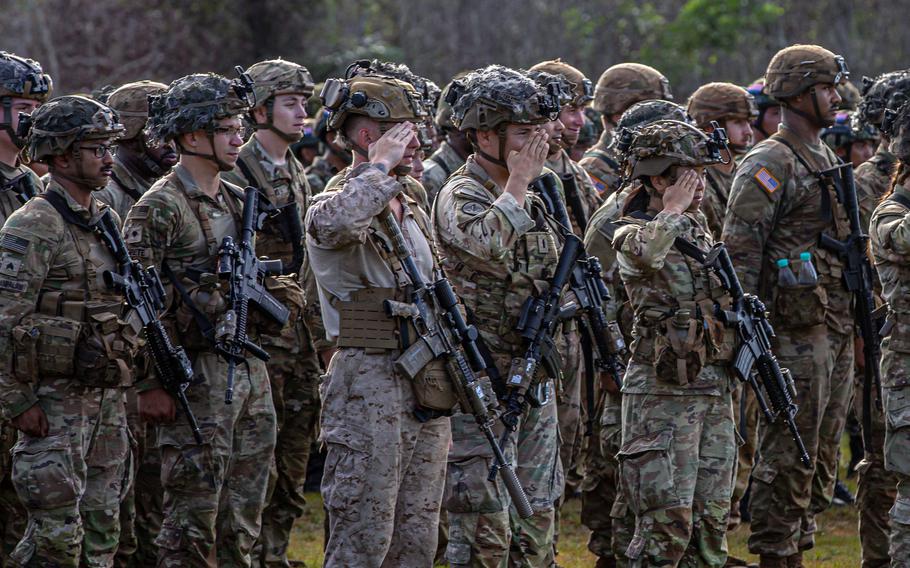
U.S. soldiers and Marines attend the opening ceremony for Keris Strike at Fort Paradise, Malaysia, June 28, 2024. (Evangelos Wilson/U.S. Army)
Hundreds of U.S. soldiers and Marines recently wrapped up training in Malaysia, an island nation that steers a neutral course between U.S. regional interests and Beijing’s maritime claims in the South China Sea.
The U.S. troops practiced their ability to operate with Malaysian and Australian forces along the western coastline of Borneo, facing the contested South China Sea. Three countries — Malaysia, Indonesia and Brunei — have territory on Borneo, the world’s third-largest island.
More than 500 members of the 3rd Squadron, 4th Cavalry Regiment from the U.S. Army’s Schofield Barracks, Hawaii, arrived in Southeast Asia on June 20, unit commander Lt. Col. Joshua Suthoff said by phone Friday from Borneo.
The troops arrived on the island by air while their vehicles and gear came by sea as part of Operation Pathways, he said.
“It allowed us to stretch our logistics,” he said of the training.
On Friday, the squadron, part of the 25th Infantry Division, concluded its part in an annual, expeditionary-style campaign in Brunei and Malaysia.
“We travelled [75 miles] along the western coast of Borneo operating around the local population,” Suthoff said.
The trip allowed the Americans to hone fieldcraft and tactics in a new and larger area than their Hawaiian training grounds, he said.
In Brunei, U.S. soldiers joined Pahlawan Warrior, June 20-30. The training included a field exercise and live-fire drills with local forces, Suthoff said.
Malaysia, with a population of nearly 35 million, is divided by the South China Sea. It occupies the Malay Peninsula that flanks the Straits of Malacca, an important international waterway, and, across the South China Sea, the northern quarter of Borneo.
The nation’s leader, Prime Minister Datuk Seri Anwar Ibrahim, speaking Sept. 13 in Singapore, said Malaysia must remain “fiercely independent” and not be forced to choose sides between the U.S. and China, the Daily Mail reported.
Although parts of Malaysia’s ruling class have close ties to China, most Malaysians are leery of their much larger neighbor, according to Grant Newsham, a retired Marine colonel and senior researcher with the Japan Forum for Strategic Studies in Tokyo
“And that includes the Malaysian military,” he said by email Friday.
While Malaysians acknowledge the benefit of the international order secured by the U.S., they consider the threat from a rising China as exaggerated, according to Ngeow Chow Bing, writing online in August for the Carnegie Endowment of International Peace.
Malaysia and Brunei are two of several nations with territorial claims in the South China Sea. Virtually the entire body of water is also claimed by China.
In Malaysia, the U.S. Army contingent linked up with 45 Marines as well as Australian and local troops for another drill called Keris Strike, Suthoff said. The exercise culminated Thursday with a simulated attack.
“There was a fortified objective by the beach and the Malaysian and U.S. troops and Australians did a joint attack,” he said.